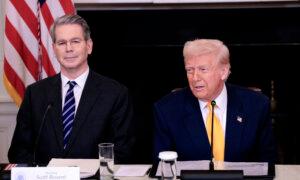Trump’s economic agenda ‘is bearing fruit,’ says Treasury Secretary Scott Bessent.
Treasury Secretary Scott Bessent appeared before the House Appropriations Committee on May 6, talking to lawmakers about a wide range of issues, from tariffs to the debt ceiling.
Bessent touted President Donald Trump’s economic agenda of deregulation, tax cuts, and trade changes.
“These are not standalone policies. They are interlocking parts of an engine designed to drive economic growth and domestic manufacturing,” Bessent said in his opening remarks before the Subcommittee on Financial Services and General Government.
“Already, this agenda is bearing fruit,” Bessent said in his opening remarks.
Here are key takeaways from the roughly 90-minute hearing.
Many lawmakers on both sides of the aisle centered the conversation on the Trump administration’s fundamental changes to trade policy.
Bessent reiterated that the United States is negotiating with 17 major trading partners and noted that the White House is not engaged in discussions with China regarding tariffs.
“China, we have not engaged in negotiations with [them] as of yet,” he said.
The Cabinet secretary believes some trade deals could be announced this week.
“I would be surprised if we don’t have more than 80 or 90 percent of those wrapped by the end of the year, and that may be much sooner,” Bessent said.
“I would think that perhaps as early as this week, we will be announcing trade deals with some of our largest trading partners.”
These efforts will result in a “substantial reduction” in foreign governments’ currency manipulation, industrial subsidies, and non-tariff trade barriers.
Trump recently stated that he would eventually lower tariffs on the Chinese regime.
In an interview with NBC’s “Meet the Press with Kristen Welker,” which aired on May 4, Trump said that Beijing wants “to do business very much,” citing the country’s slowing economy.
He also told reporters on board Air Force One that he is pursuing a “fair” trade agreement with China, adding that the world’s second-largest economy has taken advantage of the United States for years.
‘Who Pays the Tariffs?’
During the hearing, Bessent engaged in a tense exchange with Rep. Mark Pocan (D-Wisc.).
“Who pays tariffs?” Pocan asked.
“It’s a very complicated question,” Bessent responded.
The Wisconsin lawmaker repeated the question. “You clearly aren’t going to answer the question,” he said.
“It’s not complicated,” Pocan stated. “Consumers pay tariffs.”
Pocan noted that, as a small business owner, he has already been slapped with tariff surcharges by his suppliers.
“We are getting screwed right and left because of the indiscriminate use of tariffs,” he added.
Before his time expired, Pocan presented the question again.
“The history would show that it is a complicated mix of who pays the tariffs over various times,” Bessent said.
Tariffs are taxes paid by companies or individuals importing goods from foreign markets. Governments use levies to control and manage global trade.
US Debt Limit on ‘Warning Track’
The U.S. government’s debt ceiling is “on the warning track.”
Bessent confirmed that the Treasury is still calculating the influx of federal tax receipts that arrived around the April 15 deadline.
This will allow the U.S. government to provide a more accurate estimate of when it will exhaust its borrowing capacity.

The national debt clock is displayed in Washington on April 14, 2025. Madalina Vasiliu/The Epoch Times
“Just as an outfielder running for a fly ball, we are on the warning track,” Bessent said in his testimony. “And when you’re on the warning track, it means the wall’s not far away.”
He added that an update on the X-date—an approximate date when the Treasury can no longer meet its financial obligations unless Congress raises or suspends the debt limit—will be “forthcoming.”
However, it could be as early as May or June “if the government’s borrowing needs are significantly greater than CBO projects.”
The U.S. debt ceiling was reinstated at $36.1 trillion on Jan. 2.
To avoid breaching the statutory borrowing limit, the Treasury has been employing so-called extraordinary measures, such as redeeming existing or suspending new investments, completing debt swap transactions, and tapping into the Treasury General Account at the Federal Reserve.
US Is Not in a Recession: Bessent
When asked by Rep. Steny Hoyer (D-Md.) if the United States is in a recession, Bessent pointed to the data suggesting that the economy is not facing a downturn.
“I believe in data, and there is nothing in the data that shows that we are in a recession,” Bessent said. “As a matter of fact, the jobs report has surprised to the upside.”
Because of the noise in the initial economic data reporting, Bessent believes these economic numbers will be “subject to substantial revision.”
In addition, Bessent espoused the need to embark upon the administration’s reforms. He pointed to the federal government’s deficit-to-GDP ratio of 6.7 percent, “the largest we’ve ever had during peacetime or non-recession times.”
“So, the easy thing would be to keep spending, to keep the economy running on an unsustainable path of government spending,” Bessent stated.
Hoyer pushed back, telling the Treasury secretary that the government has neither a revenue nor a spending problem.
“It’s a pay-for problem,” said the subcommittee’s ranking member.
“If we would pay for what we buy, whether it’s defense or non-defense, we wouldn’t increase the deficit.”
According to the Monthly Treasury Statement, the federal government has registered a $1.3 trillion budget deficit in the first six months of fiscal year 2025.
Washington received $2.26 trillion in tax collections and is estimated to generate more than $5.56 trillion this year.
At the same time, federal outlays have exceeded $3.5 trillion, led by Social Security ($775 billion), net interest ($480 billion), health ($478 billion), and Medicare ($469 billion).
Original News Source Link – Epoch Times
Running For Office? Conservative Campaign Consulting – Election Day Strategies!


